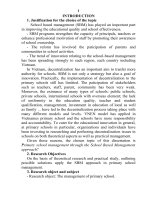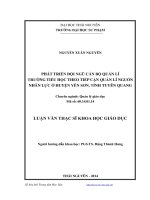(TÓM TẮT LUẬN ÁN TIẾN SĨ KHOA HỌC GIÁO DỤC BẰNG TIẾNG ANH) QUẢN LÝ TRƯỜNG TIỂU HỌC THEO TIẾP CẬN QUẢN LÝ DỰA VÀO NHÀ TRƯỜNG
Bạn đang xem bản rút gọn của tài liệu. Xem và tải ngay bản đầy đủ của tài liệu tại đây (182.82 KB, 24 trang )
1
INTRODUCTION
1. Justification for the choice of the topic
School based management (SBM) has played an important part in
improving the educational quality and school effectiveness.
- SBM programs strengthen the capacity of principals, teachers or
enhance professional motivation of staff by promoting their awareness
of school ownership.
- The reform has involved the paticipation of parents and
communities in school activities.
- The trend of innovation relating to the school-based management
has been spreading strongly to each region, each country including
Vietnam.
In Vietnam, decentralization has an important aim to tranfer more
authority for schools. SBM is not only a stratergy but also a goal of
innovation. Practically, the implementation of decentralization to the
primary schools still has limitted. The paticipation of stakeholders
such as teachers, staff, parent, community has been very weak.
Moreover, the existence of many types of schools: public schools,
private schools, international schools with overseas element; the lack
of uniformity in the education quality, teacher and student
qualification, managerment, investment in education of local as well
as family ... have led to the decentralization process taking place with
many different models and levels. VNEN model has applied in Vietnames
primary school and the schools have more responsibility and accountability.
To cater for the educational innovation in general, at primary schools
in particular, organizations and individuals have been investing in
researching and perfecting decentralization issues in schools on both
theoretical aspects as well as practical management.
Given these reasons, the chosen topic of this dissertation is
"Primary school management through the School Based Management
approach".
2. Research Objectives
On the basis of theoretical research and practical study, outlining
possible solutions apply the SBM approach in primary school
management.
3. Research object and subject
- Research object: The management of primary school.
2
- Research subject: Applying the SBM approach in primary school
management in Hanoi.
4. Research scope
Content:
- Research on theoretical problems of school-based management,
particularly focusing on sharing issues and participation of
stakeholders in the management of primary schools.
- The thesis has more focused on the experience implimenting
SBM in developing countries which have many similar fields with
Vietnam.
- The SBM approach with the paticipation of stakeholders has been
applied by principal at Ha noi Primary school.
- Proposing methods have applied in managing the primary schools in
Vietnam towards enhancing the sharing and participation of stakeholders.
- Leader and manager person at primary school is Principal.
Geography: Survey at primary schools in Ha Noi
Timing: from 2012 to 2016;
Guests can survey: Officials and education department leadership,
principals, teachers, parents and communities have involved in the
primary schools in Hanoi.
- Impact Test: The thesis tested at Doan Thi Diem private primary
school.
5. Hypothesis
School Based Management representing the decentralization to the
schools is being widely applied in the world. In Vietnam, the primary
schools have been given more accountability and responsibility.
however, there have been still shortcomings, limitations, failing to
meet with the requirements of present practice in management
functions such as planning, directing the implementation,
implementing, and monitoring and evaluating... If the solutions for
applying SBM are developed , they will create a mechanism for
improving higher accountability and responsibility of primary schools,
contributing to the innovation of the primary school and improving
education quality.
6. Research tasks
Systemizing the literature review about SBM and the implimenting
of SBM in the world;
3
Survey and assessment of SBM at Primary school in Ha Noi,
Vietnam;
Proposals of solutions to apply the SBM approach at Primary
schools in Vietnam; Test a minor method to apply the SBM approach
in Primary schools.
7. Research Methodology
The thesis has used the methods of theoretical study; empirical
research (survey using questionnaires, interviews, expert, experiment);
mathematical statistics.
8. New contribution of the thesis
- Updating literature perspectives as well as completing literature
framework for SBM and management of primary schools through the
SBM approach.
- The implimentation of SBM in primary school management at
Hanoi has been described with different aspects.
- There are four methods proposing in the thesis through the SBM
approach: Improving principal management competence through the
SBM approach.
9. Arguments protection
- The School Based Management approach is decentralized which
has been suitable with the educational management innovation by
increasing the accountability and responsibility of the schools in
Vietnam.
- Vietnam has tranferred the authority to lower lever but this
process has limmitted at school level frommthe SBM approach.
- School-based management is one suitable approach to manage
primary school in Vietnam. School-based management plays a key role
in ensuring and improving the quality of education.
CHAPTER 1. THEORETICAL BASIS FOR PRIMARY
SCHOOL MANAGEMENT THROUHG THE SCHOOL BASED
MANAGEMENT APPROACH
1.1. Overview of problem research
SBM has been studied by many authors throughout the world.
These aspects connecting to SBM are mentioned very comprehensive
but some issues still need to be resolved.
Firstly, the content of school-based management, how to
implement successfully ... have been mentioned with many different
4
viewpoints but the problems have been still addressed very thinly, and
each author exploits in a different aspect. The content has been focused
on studying by foreigner researchers, domestic researchers do not
mention alot or with limited capacity.
Secondly, the authors have had many definitions of school-based
management but have not come to an uniform definition, There are
not having the generalization about literature review of the levels of
participation of stakeholders in decision making proccess.
Thirdly, the case studies of school-based management for all
educational levels and grades of the national education system,
reseaching of the school-based management in primary schools has
been limmitted.
Finally, the reasearches are mainly theoretical, or just a set of
documents with legal character in Vietnam. Innovation management
has been very diverse education but disagree in the entire educational
system, each facility has had its own way, own use, so there is lack of
comprehensive review of the process of innovation as well as research
on practice in a comprehensive manner.
1.2. Literature review for School Based Management
1.2.1. Definition
SBM: School-based management is the decentralization of
authority from the central government to the school level, attracting
the participation of stakeholders on decision making for operating the
school and improving the efficiency and quality of education.
1.2.2. The reason of formation and the principles of SBM
The reason
In the early years of the 1960s, there are two elements in the field
of education affecting the collective rights also appear.
In terms of organization, focusing mechanism has created many
barriers to the fields, reducing their ability to reach the goal of
national education. In addition, educational programs are periodically
introduced by experts and communities that political pressure is
growing on the government side, the expectations of the management
agencies, from the central to local levels, legal systems, all things
make the school become more complex, make the education system
become a victim of its own.
In terms of supportive state for education, the state has a lack of
effective support for the education system and its output.
5
In this context, the economic crisis of the 1970s and 1980s had a
profound influence on education system. Many people have believed
that the quality of education would be changed into the new
development because the educational reform has moved from the
classroom to the school organization level, restructed the education
system and instructional management style.
Considering the dimensions of the elements of the school itself has
a great influence on the appearance of school-based management,
including: Competitive Factors; The needs of the population; Trend
improve education standards.
1.2.3. The models and levels of SBM
The models:
* The Authority Continuum
Power limit depends on the degree of expansion of management
participants and the fileds that school has been tranfered. Based on this
classification there are 5 types of school-based management
- Weak Authority
- Moderate Authority
- Somewhat Strong Authority
- Strong Authority
- Very Strong Authority
- * The Accountability
- The Accountability is the key to connect the management
proccess. Many countries have implimented SBM to improve
accountability as well as explicit management. There are three types
of responsibility for managing in school-based management:
- Being responsible for complying with the rules and the superior
authorities.
- Being responsible for building regulations and colleague
- Being responsible for the quality of training and society
* The Autonomy-Participation Nexus
The aspect concerned in many school-based management models
is the decision-making transferring to the school level. According to
the study, currently there are four effective models for determining
who is empowered to make decisions in school-based management
(Leithwood and Menzies, 1998): Administration ; Professional
managers; Community management; Operating balance.
1.2.4. The levels of school-based management
6
Based on the analysis of school - based management models in the
world, school-based management can be divided into five levels from
"weak" to "strong". The levels of SBM depends on the authority being
tranferred to school from the centre government. However, Five levels
of SBM have not related to the school quality, they have determined
the degree that the school has been decentralized.
1.2.5. The Characteristics of school based management
- The decision-making, accountability and management in school
have been transferred from Government to school (the Principals,
teachers, parents, communities, sometimes pupils). Howerver, Every
member has not always managed the school. Somewhere, The
Principals and teachers are the people making decisions. Parents as
well as communities are just only devolved or taken part in some
limmitted aspects. Each situation has one componet involving in
school making decision.
- The purpose of school-based management ensures the fairness,
accuracy and transparency of the decision making to improve the
quality of education. Therefore, one of the most important
considerable issues has to promote that is positivity and creativity of
people through building a sharing culture and participating in different
levels in the different contexts.
- The school council has decided a lot of problems or aspects of
school activities such as: dividing finacial, hiring or firing teachers
and staffs, curriculum development, choosing textbooks, investing
fundamental, evaluating teachers and pupils, solving welfare,
cooperation.
- The principal is a member of school council having legical
posision, howerver many individual components or units can take part
in school decision making.
1.3. Theoretical framework of Primary school management
1.3.1. Fundamental concepts
School management: School management is the process of
purposeful impact, orientation and plan impact of the master (led by
the school principal) to the object management (teachers, staffs,
learners, resources) to carry out the mission of the school for the
education system and training, community and society in order to
achieve the objective of education identified in a changed
environment. The role of manager and objects management is
changing in the direction of democratization and participation.
7
Primary school management: Primary school management is the
process of purposeful, oriented impact, and plan impact of school
leaders headed by principals to teachers, staffs, students and the
sources to fulfill elementary school mission for the education system
and training, community and society to achieve the objective of
primary education identified in a changed environment.
1.3.2. Primary in the Vietnamese education system:
Primary school is the common institution of the national education
system, with legal status, an account and seal. There has been a lot of
innovation in Elementary education: VNEN, evaluation, curriculum
development according to competence…
The type of Primary schools: Vietnam Primary Schools are held in
two basic types: Public schools and Private schools.
The goal of Primary school: Primary school has buit the
fundamental knowledge for childrent in the next proccess.
1.3.3. Government management of primary education
The People's Committees of district is responsibility for the
Primary School. Education and Training Division is responsibility for
government management functions for all types of elementary schools
and other educational institutions, implementing primary education
programs in the local. In special cases, the government management
for primary schools has been held by the authority established to
manage.
1.3.4. Managing of Primary Principal
Primary Principal Management complys with the Law of Education
and charter schools. Principal is recognized by local government. The
Principal has the key role as a leader in the organizations
1.4. Contents manage primary school from the SBM approach
1.4.1. Building the school's culture with paticipation and sharing
School-based management emphasizes the work environment or a
cultural organization with a shared and respected staff. Organisation and
management of primary schools have based on the school with the
following directions:
- The clearly, feasible and highly flexible objects
- Specific management activities have derived from the needs of the
schools
- The school has a vivid vision, mission, and focus on teaching and
student learning proccess. Such issues are products of collective,
8
process-oriented management decisions and connect the development
phase of the school; affirmed the responsibility and accountability of
schools for the learning outcomes of students
- The school is organized in groups and organizations, emphasizing
the empowerment process, authorize matching the capacity of
stakeholders inside and outside the school.
- Schools need to demonstrate transparency in management, income
mechanisms and handling public information, seamlessly creating
relationships effective communication within and with the parties
involved in the school.
1.4.2. Operating school council with the attendence of stakeholders
Regarding the organizational structure and elected members: To
ensure the school council expressing the spirit of accountability and
responsibility at the school, the parents, communities, teachers, even
students are integral components to attract in decision making.
The operating principle of school boards: To ensure school
councils operate effectively and identify mechanisms to work for this
organization. Typically, there are two main forms for active
management decisions of the school board.
Based on different levels of SBM, the school board has two basic
models are: Model Advisory: school councils help principals
informing decisions by offering ideas and options. The decision of the
principal form has usually associated with building consensus. This
model is fitted with SBM in weak and moderate levels. With SBM
strong level, school council has usually existed as attended
management model; school boards has participated in making
management decisions concerning important issues such as school
finance, human resources, program participation ... the greater of
stakeholders present the higher level of decentralization to the field to
improve the efficiency of school education.
1.4.3. Perform functional decisions in managing schools
* Rule
The sharing in decision making proccess in the school-based
management approach includes:
+ That is the process of opening and ensuring all stakeholders fully
understand the problem to decision
+ In accordance with the practice of schools
9
+ The decision issue bases on the basis of information provided
accurate and complete information about the problem
+ Principals create the relevance of the different participations and
a separate treaty on decision making.
* Element
The school board replaces the power of government authorities and
the higher educational leadership, ensuring the decision-making at the
school has took place in a cooperation. At the highest levels of SBM,
the Council has replaced the principal in the decision making proccess
to guarantee all members of the council have equal opportunities when
issuing decision making related to the interests of the school.
* Content management decisions
The problem of the school is not subject to the rules and duties
outside the school, the participants are involved to provide essential
needs to the school through involvement and commitment to the enact
policies and decisions making.
1.4.4. Establishing the role of principals in school management
The models of school-based management have been widely
applying in the world, the principal has been given much more
authority in dealing with the problems in their educational institutions.
The role of the Principal is shown briefly on the following aspects:
- Principal was shown a spirit of cooperation, collaboration. The
pricipal is a member of a team, not as a leader.
- Principal has created a high level of commitment, found the
encouragement and support, the advice from the parties related to the
school, motivational, beliefs, property, a stable institutional
environment strongly towards an effective school is measured by
academic achievement of students.
- Principal has attracted the participation of a large number of
people involving in the school and effective implementation of the
authorization. Principals and staffs often have the discussion and
agreement on the issues of the school.
- Principal has made the motivation, confidence, ownership, a
strong environmental organizations towards an effective school. The
role is measured by academic achievement of students.
1.5. Factors affecting the management of primary schools from
the Schol Based Management approach
1.5.1. The objective factors
10
Factors outside the school have been relating to the success of schoolbased management including: perspective system, policy steering nature
education development strategy; and operation of bodies of state
management in local education-related activities of the school; Investment
resources for reform: in a style based management model school, some
resources have not been awarded to the state school of management, the
success of reforms depends on This level of resources being transferred as
well as any kind of resources will be transferred.
1.5.2. The subjective elements
The internal factors have affected the efficiency of the SBM include: the
school needs to develop a strategy and vision to reform clearly and have a high
consensus, sharing and widely understood ; Capacity management of principal,
teachers, parents; Transparency in management through maintaining
responsibility and the supervision of the community involving in decision
making about the management of the school; The participation of the
stakeholders on accountability and responsibility over the operation of the
school. The internal factors have affected the school-based management concept
coming from the local level, including community members, parents, teachers,
staffs and Students who have more information about the school, rather than the
central government.
CHAPTER 2. PRACTICAL BASIC OF PRIMARY SCHOOL
MANAGEMENT THROUGH THE SHOOL BASED MANAGEMENT
APPROACH
2.1. SBM programmes in the world
Many developed countries, developing countries in many different
political systems have implimented SBM with the aim of
strengthening the capacity of principals, teachers by promoting their
awareness of ownership for the school. The current financing portfolio
of the World Bank for the school-based management projects has
mainly been countries in Latin America and South Asia, including
Argentina, Bangladesh, Guatemala, Honduras, India India, Mexico,
and Sri Lanka. Moreover, a large number of current projects in Africa
region have focused on strengthening the capacity of members of the
school Council. Also, there are two projects of the school-based
management is supported by the World Bank in Europe and Central
Asia (in the Republic of Macedonia and Yugoslavia in Serbia and
Montenegro), a country in East Asia and Pacific Ocean (Philippines),
the Middle East and North Africa (Lebanon).
11
2.2. Organization surveying the status of primary school
management in Hanoi through the school based management
approach
2.2.1. An overview of Elementary in Ha Noi, Vietnam
Elementary educational system: Hanoi has aproximately 710
primary schools (including 6 Junior High School), this number
increased to 8 from the academic year 2013-2014, the number of
students is 584 495 (up 21 267 students compared with last year; a
total of 15 316 229 class increased compared to year classes from
2013 to 2014.
Regarding the direction of teaching and learning activities: Hanoi
Department of Education is the pioneer that implementing quality
improvement, innovation activities of professional organizations,
performing VNEN. Teachers have initially applied the requirements in
teaching methods of VNEN; created a tight bond of parent and
community participation in school activities and education of students
with appropriate activities.
Regarding the quality of primary education in Hanoi: The
Department has directed 100% of the implementation of Circular No.
30, dated 28.08.2014 of the evaluation and grading of primary school
students. Students with special need reviewed under the guidance of
9890, dated 17/9/2007 of the Ministry of Education and Training. In
the first performance evaluation by reviewers for students of different
grades, the Department has evaluated the specific instruction for
elementary school students throughout the city, initially had positive
changes in awareness for officials , teachers, students and parents; has
had positive results. The rating process is emphasized with combining
assessement by monthly review and periodic inspection results last
year.
2.2.2. Purpose Survey
The thesis has Surveyed the management of primary schools
through the school-based management approach in terms of: building
the school culture sharing and participation; Operating of the school
council has attended by stakeholders; Performing functional decision
making in school management; Establishing the principal roles in the
school management has been evaluated by teachers, parents,
communities, principals at public primary schools and private primary
schools and education department officials in Hanoi. Evaluation of
12
subjective factors and objective management have affected primary
schools under the management approach. They are the basic to
propose methods to manage elementary schools to improve
educational quality at the Hanoi primary schools.
2.2.3. Content of survey
- Surveying the status of primary school management under SBM
approach at the Hanoi primary schools.
- Assessment of the status of the Hanoi primary schools under the
school-based management approach in relation with the quality of
school education.
2.2.4. Survey Methodology
* Investigation Questionare Methodology
* Observation Method
* Interview Method
* Statistical method
* Review the survey results
Survey sample
Survey sample of the thesis is 377 managers, teachers, parents,
communities, staffs of Elementary department of 32 schools in Hanoi.
2.3. Current status of primary school Management from the
SBM approach
2.3.1. Current status of building school culture relating to
sharing and participating
- Work environment
Both teachers and principals have evaluated low contents relating
to sharing school mission. In interviews, many teachers and principals
said that they did not really know about the vision, the mission of the
school and not see the vision, the mission beeing expressed in the
daily operation of the school. They did not fully attend to build and
not to create conditions to encourage dissemination. This shows that
the construction, the sharing school mission and vision have not been
suitable with the location and need for specific solutions to address
these points appropriating.
- Cultural sharing
According to the results obtained from the referendum vote, in
generally, teachers, parents, colleges have assessed the sharing
management of primary school management better than the comments
of principals and Managers. Among contents also have some
13
differences in the assessment. The first Content has received good
reviews of teachers, principal, colleges and manager but in the opinion
of principals evaluation is not good. At the second content, the
principals have evaluated higher than three remaining groups.
In interviews, some principals and teachers said that the
participation of the paticipants is not high due to be dominated by
authoritarian leadership style of principals, a lack of positive activities
of teachers, as well as the sentiment expressed views, submissive
ideas and execution. This is an important basis for the proposed
measures in chapter 3.
The private primary schools have performed better sharing in
management than public primary schools. Through interviews,
respondents in four groups agree with the statement: the level of
sharing in the public primary schools have been less than private
primary schools because schools are considered to enhance
educational quality and brand is vital to one of the basic points to
achieve that is to create a working environment with the sharing
agreement and the participation of many stakeholders, especially
teachers in teaching and education of students because they are closely
associated with students and parents, colleges more than others.
2.3.2. Curent Status of school councils have operated with the
participation of stakeholders
The existence of the school Council
According to the survey results, there are amount of 100% of
teachers, managers being aware of the existence of school councils in
the organization of primary schools. In particularly, there are some
parents, who do not know the school they send their children to school
has a school board or not.
Composition of the Board
Results of the survey on the subject with the principal, teachers,
managers have a strong consensus on the current composition of the
schoolCouncil. All the reviews have agreed with many components
such as the school Council in Law Education in Vietnam.
Time meeting of the school Council
According to survey results, primary school councils have been
met from 2 or more times in a year, but many schools are holding
meetings from 3 times a year.
How members elected school council
14
There are three ways elected School Board members being given
consulted with principals, teachers, parents and managers including:
President, Chairman designate; Some people recommend and take the
vote; Secret ballot.
The problem in the operation of school councils
From the results, it can be seen to enhance the uptime of school
council, accountability and responsibility in decision making. In
particular, the current composition of the Director board may be to
changed when the paticipant have involved into the composition of
school council. This requires a change not only of the school but also
should be reflected in all policies of school council. School council
attended characterize of SBM. The legislators, the managers and
managing levels should devote special attention to this issue.
2.3.3. Current Status of implementation of decision-making
functions in school management
The content of school management decisions
- Overall score in the evaluation of principals, teachers, parents,
colleges, Managers are both rated higher level decisions of the
stakeholders for two basic contents: Mission, vision; strategic plan and
planning action but had very few decision of Choices curriculum for
students; Recruitment of teachers and staff; Selection of reference and
textbooks.
- The differences have been assessed in the content of the way
teaching and learning, applying program; Welfare fund managers. The
differences in the assessment of the degree of autonomy by the public
and private primary schools has been notsimilar to this content.
Interview private school principals showed the teacher of the school
must adhere to the content, method and content of the lesson, while
private school principals school said the school has to follow the joint
program of the Ministry of Education and Training. There is 20% selfdevelopment of school programs and extracurricular activities. Even
with private primaryvschool Doan Thi Diem, principal said durations
core academic courses to students lingering ensuring joint program,
learninparents and colleges.
- Comparing with the level criteria of SBM, managing primary
schools have limitted. To improve the quality of education needs to
empower the school to handle the problems of the school itself, close
to the needs of parents and students and the community. Currently, the
15
school's activities are implemented under the direction of the outside,
not from the school itself
- Participants
Most principants, teachers, parents have assessed the participation
of stakeholders in less negative level, only limitted participation in
some little problems
- With Managers, they have a positive assessment than the
participation of the parties concerned. Through interviews, Manager,
said that the participation still missed volunteers, businesses, medical
staff, security staff, but the school board members, principals, teachers
have attended and decided most of the issues the school towards
improving the quality of school education. Additionally, the high
school attended private primary schools and better than the public
primary schools both in the diversity of ingredients and level of
participation.
Comparing the level of participation in decision making on the
issues in the case of public and private primary schools members, the
assessment about the participation in decision making at the public
school is lower than private primary schools. This result is currently
consistent with management mechanisms existing for the two types of
schools in the national education system. Private Schools initiative
and autonomy in decision-making of all issues have related to the
school: HR, finance, programs and cooperation .... To meet the
increasing demand parents, parents voices and teachers are respected
and consulted periodically. Meanwhile in public schools with staffing
mechanism on personnel, state budget allocation for education as the
current voice of parents, community and teachers sometimes has not
been placed in a position worthy.
Summary: The study has appreciated the participation of
principals, teachers and members of school council and decided the
level of these two components to the problems of the school.
However, the little composition has mainly appreciated: Volunteers,
students, and community organizations. Through interviews most of
the guests could have involved the provisions of the education law,
charter schools showed absence primary components of legal
documents. To perform SBM, we should have adequated legal
framework, clear as a basis to guide the operation of the school.
16
2.3.4. Current Status of establishingt the principal role in
managing school
The principal has recognized the key role who connected the
components involving in the management of schools. However in the
process of implementation has gained the participation tight yet
Through interviews, several principals said that the training
program which they have participated being content management
training and leadership. They say about the plan, however, have not
focused on the authorized issue, lack of the practical exercises.
Therefore, when applying the reform, they have had many difficulties.
This shows that principal should study and training about practical
training in the work, the training program. They should closely follow
the actual management of primary schools, go to the more practical
content.
Both principals and teachers are aware of principal role but in the
process of performing and not achieve the desired effect. Hence, the
need to closely correlate unified between awareness and action against
the principal issues related to the management role.
Comparing the level of participation of professional activities to
enhance the leadership role of the public and private primary schools,
principals of private primary schools have involved more in activities
to enhance the leadership and school management. This result is
currently consistent with management mechanisms existing for the
two types of schools in the national education system in Vietnam.
Private primary school principals have been initiative and autonomy
in learning, improved self-respect both fostering and participating in
training courses, but the public school principals has wanted to
participate in key management capacity to face with many difficulties
than the private schools. For example: indicators and approvment
field.
Summary: The principal has issued decision making basing on the
participation of members of the school, However, the level of
performance is not closely correlated with cognitive and action
expressed decentralization being implemented within the school but
the school has not been good and still entangled management
mechanism from above.
2.3.5. Current Status of factors affecting the management of
primary schools from the school-based approach
17
School-based management implementation in primary schools is
governed by factors within inside and outside of school. In the context
of managing the current primary school in Hanoi in particular and the
country in general, the external factors have associated with the
guidelines and the elements inside can not promote all positive
impact, causing certain obstacles for autonomy in school management.
At the school, the principal has been strong influence on the school's
management implementation. Besides, the participation of
stakeholders in the issue of the school will decide the level of school
autonomy. To be able to access the nature of the school-based
management, through the results of the evaluation factors in and out of
school, the school needs a legal framework enabling autonomous and
self home Schools must have adequate capacity for autonomy.
2.4. Assess the situation
Achievements
Through investigating primary school management situation from
the SBM approach in Hanoi, there are some positive activities and
considered achievements in managing primary schools including:
Firstly, The primary schools have been struggling to gradual build
a sharing environment, this is an important condition for strengthening
the participation of stakeholders in school management aiming to
improve the efficiency of education.
Secondly, The primary schools have been established the School
councils and they are managered by the provisions of the legislation. They
have showed clearly: present composition, meeting time, way members
voted, process, how decisions.
Thirdly, The principals have confirmed the position and role of
themselves, active in the work of self-education and training
provisions to improve management capacity. The general trend shows
that the principals are authorized efforts to implement and strengthen
the autonomy of management, school leaders.
Fourthly, Many components have involved in decision making for
many different contents in the school's activities but mostly teachers,
principals.
Limitations
SBM aims to enhance the participation of all stakeholders in the
operation of the school. The levels of SBM have pursuanted to the
participants and the content of these components being decided.
18
Actually, management of primary schools in Hanoi still stand at the
lest level of SBM . This is shown in the following points:
Besides principals, other stakeholders, especially parents and
colleges; staffs as guarders, health care workers; volunteers are not
involved in the management of schools. Therefore, they have not
shown voices, perspectives and their importance. Sschool Council is
not the organisation to set of stakeholders, so the voice of the
stakeholders have not been respected and have not shown the role .
The components of Decision making are mostly principals, school
teachers. That why SBM is very at the lowest level; The contents of
the school have focused of personnel, finance, programs that have not
been empowered to school autonomy framework and very limited. We
need a shift from Government of comprehensive education to
managing in each school itself to improve management school from
the SBM approach at a higher level. The principal will have power to
choose the level of school accountability.
Principals are awareness of their role, not the limitted role but also
high role in SBM approach. Because the mechanism is limitted.
CHAPTER 3. SOLUTION FOR ADAPTATION THE SBM
APPROACH IN PRIMARY SCHOOL
3.1. Innovation-oriented Primary school management through
the school based management approach
- In line with economic conditions - political – cultural
- In line with the trend of integration of the country.
- Consistent with the fundamental renewal policy and
comprehensive education Vietnam
3.2. Some solutions for managing primary schools from the
school-based management approach
3.3.1. Solution 1: Innovating the leadership capacity of school
principal at the request of SBM
Management and leadership capacity of Principal at the request of
SBM include:
1. Principal ready to change schools from SBM approach
2. Principals have influence on all teachers, staffs and stakeholders.
3. Each member is related to the school principal given a certain
influence and principal should be the conditional influences that
diversity.
19
4. Principal should become a symbol of the school, shaping their
own culture to the school
5. The basic skills have been required of the principal when the
school change into the school - based management approach including
skills of change management in programs and activities of the school's
teaching, skills of team work, skills of resource management.
3.2.2. Seting up and operating activities of primary school
councils in the spirit of accountability and responsibility
School council really become an important role in representing the
voice of the communities when they have been given autonomy to
apply in the fields: Functions and duties ; Organizational structure;
how it works; attendance areas; processes established
The field of counseling or decision of the board consists of basic
areas: Planning for development of the school; financial, property and
human resources mobilized; organization and personnel;
communication and community relations; education program;
monitoring the implementation of the resolutions of the board
3.2.3. Enhancing the participation of stakeholders in school
management
The components have involved in the management of the school
including: principal, teachers, staff, parents, community,
representatives of education authorities superiors, each member has a
different role, however ingredients have directly affected students as
teachers and parents. In the current primary school, teachers took part
in the school board but not as high as they know in the rules of law
education in the aspect of the school council, but has yet realized the
importance of the themselves contributing to the process of decision
making.
3.2.4. Building school culture towards SBM
School culture is made up of many different elements, which affect
the quality and performance of the school. To implement the schoolbased management in primary schools, especially emphasizing the
participation of the participants involving in school management, the
thesis focuses on the following aspects:
Building and nurturing vision to SBM approach
Empowering for stakeholders to share, learn in cooperation with
management is an important manifestation of the efforts put the school
from SBM approach.
20
3.3. The relationship among the solutions
Each proposed solutions performing have to show specific
consideration in relationships and their overall impact. If we too much
focus on the only one solution that can make the remaining solution
has not achieved the results and broken the balance of the system.
When implementing the proposed methods, we have to be
synchronized and have a specific plan, to be controlled and evaluated
regularly to adjust as needed. Noting combined with the practical
requirements of the sector and the conditions of the facilities, the
resources of the specific schools to make the best possible targeted
measures introduced.
Dialectical relationship between these methods have shown the
system and consistency in the implementation of the fundamental
innovation, comprehensive elementary work from the SBM approach.
3.4. Results of tests on the necessity and feasibility of measures
of solutions
To confirm the value necessary, the feasibility of management
methods being proposed, the thesis have measured the value of
methods through a referendum voting for managers and teachers in
schools.
The data in evaluation of necessity per each function of
management reaches "necessary" level or higher. Data of survey on
the feasibility of each management function have shown the measures
achieve "feasible" level to "very feasible" level.
3.5. Experiment measures of management primary school
under SBM approach
3.5.1. Purpose Test
The thesis has tested the minor method: teachers have attended to
manage curriculum development” to Enhance the participation of
stakeholders in school management and emphasize and assert
importance of the participation of stakeholders in general, the
participation of teachers in school management, in particular.
3.5.2. Subjects tested
The test have conducted on 25 teachers of grades 5 at Doan Thi
Diem private primary School
3.5.3. Content Test
- Assess teacher as a participant and responsible leadership for the
decision issued by the school, namely in the school curriculum.
21
- The role of teacher management in every step of the process of
developing the school program: Knowledge of the school program, the
implementation process development, school programs, the role of
teachers in the design, plan the teaching planning, implementation,
evaluation and adjustment program
3.5.4. Test Method
- Workshops, training in management development curriculum of
teacher
- Gather information through the questionnaires before and after
test execution
- To collect data, analyze and evaluate the results
- Making comparative report
3.5.5. Test Procedure
Step 1: Seminar and training for teachers to have access to
documentation and management experience developed teacher
education program the school
Step 2: The teacher of the course implemented their charge
Step 3: Gather information, evaluation reports
Step 4: Analyze the results and draw conclusions have mandatory
3.5.6. Analysis and evaluation of results experiment
The role of teachers in school management in general and in the
management of development programs applies in particular before the
school-based management are evaluated primarily weak. When
interviewed teachers evaluate why that content in the average for the
most part that the school teachers have many good facilities; financial
autonomy and recruitment and use of personnel quality, have a
favorable working environment with a program to follow strict
standards promulgated MOET, the teachers are conducting device
Instructional design in accordance distribution, teaching practices and
classroom assessment program adjustments. However, because the
program and textbooks so rigid timetable proactive level of teachers in
the implementation of programs is not high, even deal, students must
learn leads to overcrowding.
After testing, the most of the contents have higher average scores
related to process development the school curriculum. This shows that
the teacher after attending the seminar and training has been relatively
good awareness and implementation of relatively complete process,
22
confirmed its role as a management bar participants developed
curriculum school education.
Other contents are lower but are very good at performing and in
comparison with before have mandatory testing is much higher. The
biggest difference is reflected in the participation in the management
role of teacher for each step in the process of developing the
educational program. Through interviews, the teachers are noticing a
big difference compared with older curriculum is how clearly thenew
processes, their role, they are more active, stick to the needs of parents
and students more and thereby the effectiveness of education also
improved. The theme is designed to teach students and matching
characteristics classroom, the school, in accordance with the age and
psychology students to experience more, forming the ability to solve
many problems in practice, not only in theory as in program design in
the form of old.
CONCLUSION
In few recently decades, educational innovation is a popular
trend in many coutries in the world. The government tranfers power to
schools being the most popular trend or school based management.
The thesis has applied a lot of methods to solve some problems:
In theory
1. The concept of school-based management is the process of
transferring decision-making powers from national to school level.
2. Basic content relevants to school-based management: Facility
management form based on the school; The autonomy of the schools
including budget issues, human resources, curriculum, textbooks,
facilities, school operation plan, monitoring and evaluation,
dissemination, the involvement of parents and the community in
making and implementing the decisions of the school; The level of
school-based management; The types of model of school -based
management consist of five level from “weak” to “strong”; The
operating characteristics of the school-based management. The
charecterers og SBM consist of: decentralization, accounbility and
responsibility, sharing culture and improving effectiveness of people
in school, the role of school council as well as principal.
3. The thesis has studied the literature framework of primary
school management through the SBM approach consisting of: i) The
characteristic of the SBM approach is the sharing in decision making.
23
School council is responsible for cooperating in the decision making
process. ii) The SBM approach has forcused on building a sharing and
personal supportive work and learning environment or cultural
climate. Developing a safe and supportive work environment which
provided opportunities for staff working and personal development.
iii) Though authority transfers to school level being differnt in each
SBM model, school council plays an important part in organizing the
school. iv) The principal role has changed in the SBM approach. Each
SBM model has each principal role, especially in the decision making
problem. v) SBM as well as primary school management through the
SBM approach has been affected by inside and outside school
elements.
In practical
1. The implimentation of SBM in primary school management
in Hanoi has been described with different aspects. At school level,
the schools have tried their best to improve the paticipation of
stakehoders in school activities: teachers, parents. The paticipation
consisted of four fields: sharing and paticipation work enviroment;
decision making; school council; the role of principal. However, the
paticipation of stakeholders has limitted, especially community and
parents. Legically, practically, Student has not paticipated in
decision making process of any field. SBM in the primary schools
has been at “weak” or “average” level. The school council has not
attracted the paticipation of stakeholders in school management.
2. There are two factor groups affecting to primary school
management from the SBM approach: from insde and from outside
school. The most central key makes school manager ineffectively is
that the stakeholders have limitted power to participate into the
school council.
3. There are four methods proposed in the thesis through the
SBM approach: Improving principal management competence through
the SBM approach; Establishing and operating school council from a
sense of responsibility and accountability; attracting the paticipation
of stakeholders in school management; establishing school culture
from the SBM approach.
4. The thesis has tested a minor method: Teacher as curriculum
development manager in practice to prove the SBM approach has
active influences on changing the knowledge as well as action of
24
teachers and stakeholders in primary school activities, improving the
effectiveness of primary school management from the SBM approach.
RECOMMENDATIONS
For the education and training:
+ Improving the system of legal documents by strengthening the
autonomy, accountability for the primary schools create a legal
framework to guide the activities of the school: clear introduction for
accountability and responsibility of primary school; opening the
authority og primary school not only in financial control but also in
others fields…
+ Monitoring and observing actively in local level to help school
have real power.
+ Every managerial level cooperates in a suitable structure to
observe school activities.
+ The further research practical education reform in the world,
manage Vietnam education situation as a basis to propose appropriate
solutions
For the primary schools
+ The schools should prepare all conditions to be able to receive
the assignment, autonomy, self-responsibility.
+ Develop organizational regulations and activities of the school,
which clearly define the responsibilities of each department and each
individual
+ Identify clear migration path to self management, selfresponsibility
+ Organization summed up the experience profoundly to modify
the regulation time after school each semester of the academic year.
+ To enhance learning, exchange of experience with local and
international institutions in order to enhance management efficien









